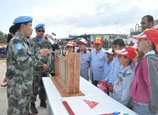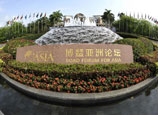
BEIJING, April 5 (Xinhua) -- Chinese scientists have made a significant contribution in the search for dark matter led by an international Alpha Magnetic Spectrometer (AMS) team.
An Alpha Magnetic Spectrometer is a particle physics experiment module that is mounted on the International Space Station. It is designed to search for various types of unusual matter.
The core component of the AMS is a Chinese-made huge permanent magnet, said Chen Hesheng, primary member of the AMS team and also former director of the Institute of High Energy Physics of the Chinese Academy of Sciences (CAS).
The magnet, jointly made by CAS Institute of Electrical Engineering, CAS Institute of High Energy Physics and China Academy of Launch Vehicle Technology, is used to identify particles carrying positive electricity from those carrying negative electricity.
"Matter known by human beings now only account for four percent of the components of the universe, while dark matter is almost six times of already-known matter," Chen said, "However, there is no proof to testify the existence of dark matter."
Chen said positrons can be produced when two particles of dark matter collide and that they will be detected by the AMS.
"Results announced on Wednesday showed that more than 400,000 positrons have been observed by the AMS. The positrons may originate from long-searched dark matter or from pulsars distributed around the galactic plane," Chen said. "Anyhow, we move a step forward towards the reliable evidence of dark matter."
According to Chen, putting an enormous magnet into space was the biggest challenge for the AMS project.
"Chinese scientists chose a new type of high magnetic energy product,Neodymium Iron Boron, and adopted a unique design of magnetic circuit to prolong the service life of the magnet upto 18 to 20 years," Chen said.

















 Snails that are as fat as geese
Snails that are as fat as geese


![]()
